Montgomery feels like a ghost town. There’s very little action on Dexter Avenue but there are signs everywhere about the past. They own the past. Unlike the rest of America, running around in MAGA HATS, denying the past so they can bludgeon the future.
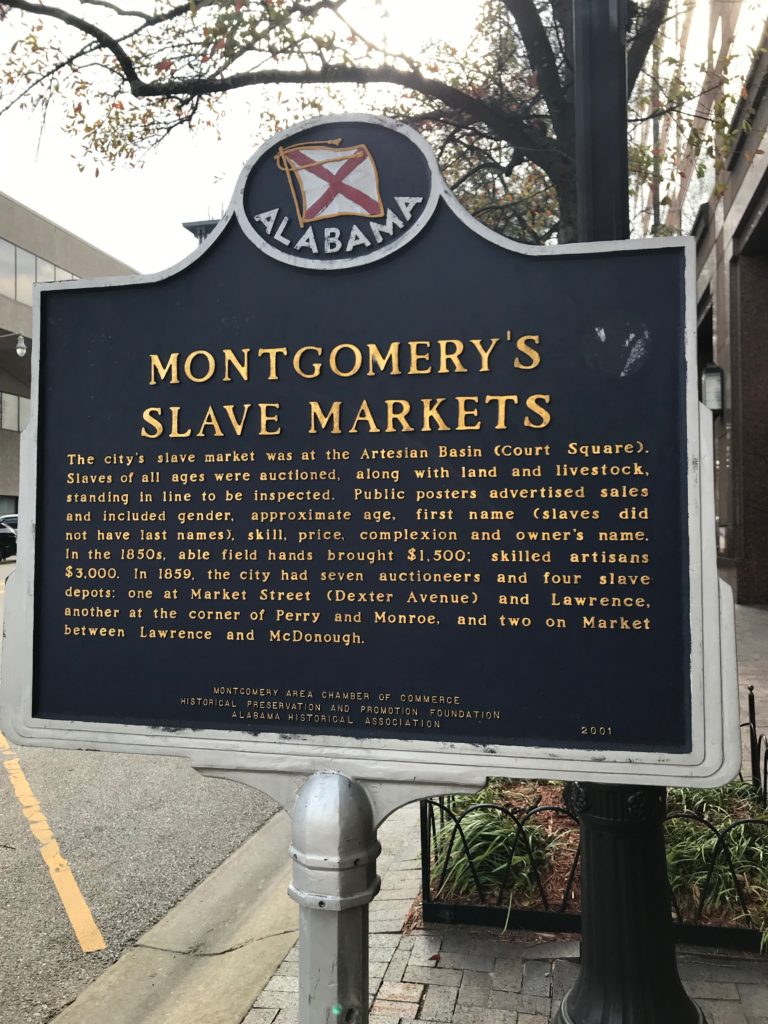
The Equal Justice Initiative is in an unassuming building. This suits the cause since I don’t think the people who work there are seeking glory, I think they’re seeking justice, I think they’re seeking mercy, which is elusive in a country where the nature of its people is to beat up on the most vulnerable instead of grappling with the idea of learning from our mistakes so we can do better things with the short time we’re lucky enough to be here.
There’s an alley next to The Equal Justice Initiative.
If you walk down the alley on the other side you’ll find The Legacy Museum. This is the reason I came to Montgomery. The Legacy Museum opened last April. I’ve been wanting to go but I couldn’t find the time. This isn’t true. I had plenty of time. The truth is, I couldn’t find the right person to share it with. Who wants to spend their vacation confronting something we’d rather push aside?
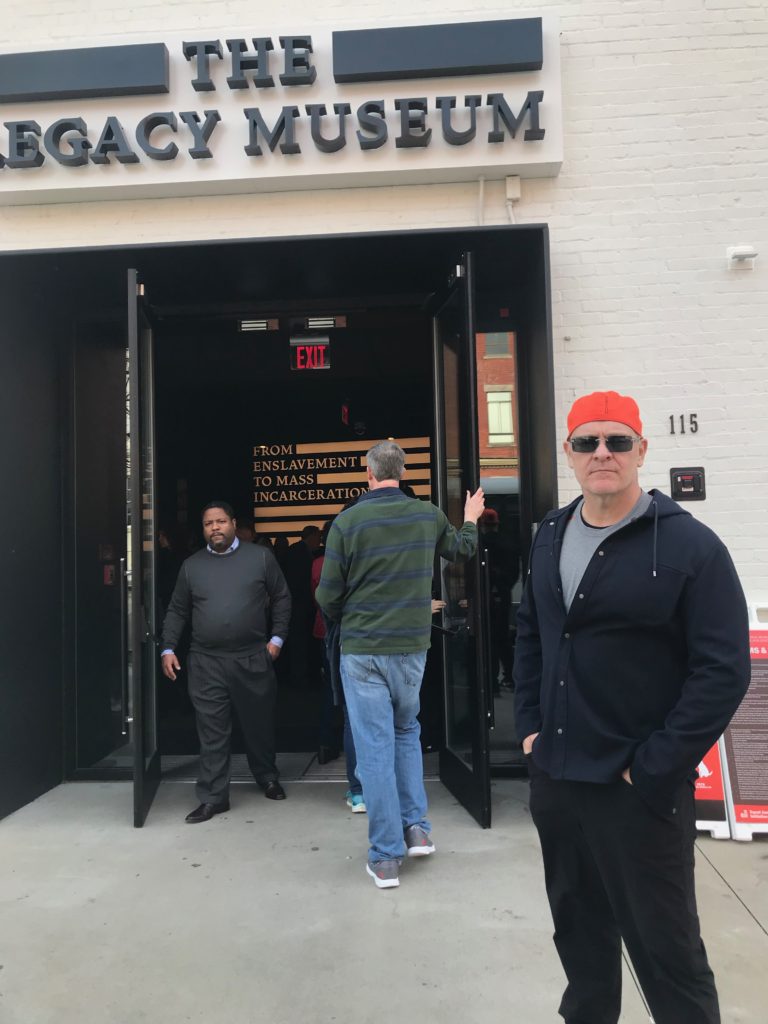
Stop whining, I’m told.
Get over it, I’m told.
You’re dwelling in the past, I’m told.
Maybe so but I have enough time in my day to embrace the people around me while at the same time finding a few quiet moments to reflect.
Of course I’d rather watch “Russian Doll.” Of course I’d rather eat the entire box of chocolates my mother sent to my girlfriend for Valentine’s Day. Of course I’d rather fill my body with endorphins hitting the heavy bag and doing cartwheels at the gym. We’re living in a moment defined by momentum.
So it’s important to stop.
Take a look around. Read the signs on Dexter Avenue and walk into Mama’s Sack Lunches to be charmed by the women in the kitchen working the hotline. Let them guide you to a breakfast you’ll be digesting for two weeks. Take in the gospel music and the feeling of having breakfast with your college roommate from 1988. There was a restaurant called Skeeters in Gainesville, Florida. We used to go there late at night, drunk and looking for trouble. I asked Vinny Vegas if he remembered the strongest memory I carry from Skeeters.
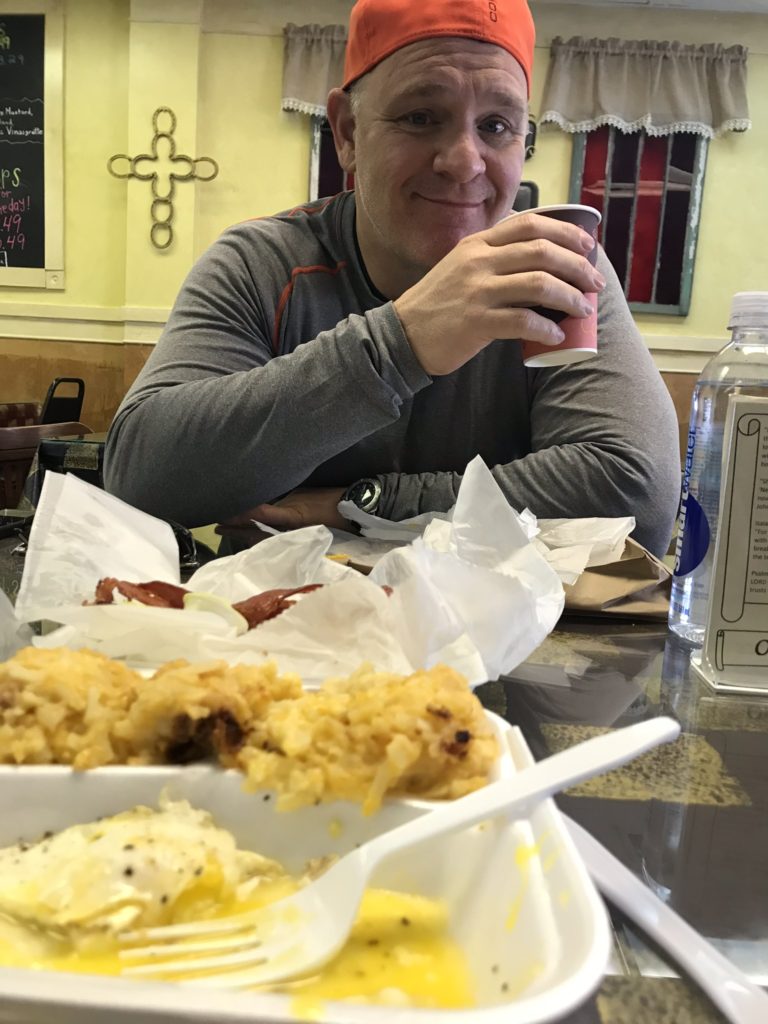
“Yeah,” he laughed. “It’s a no-brainer! I ordered The Big Asher Special. Eggs over easy. Giant biscuit. Hash browns. I ate everything on my plate. Then I called over the manager and told him I didn’t like it. I browbeat the guy until he took it off my bill. I took joy in it.”
I remember being horrified and paralyzed at the same time. It was wrong. I knew it was wrong. But I went along, swept away by youthful arrogance and momentum. We never feared for one second we’d face a consequence for our behavior. We were just kids! Somewhere in the pit of our tummies we knew we were allowed to be kids, we were protected by an invisible shield that we took for granted.
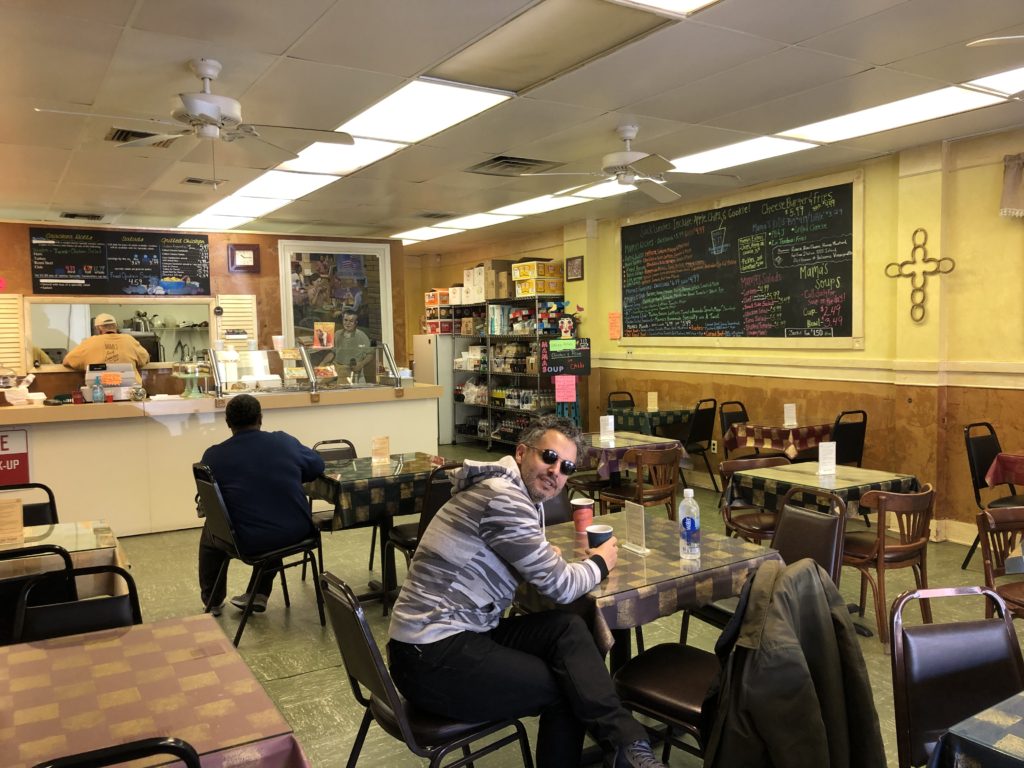
The Legacy Museum shows you what life is like for those without a shield. After slavery ended, after Lincoln wrote and signed The Emancipation Proclamation, after the Civil War ended, America entered a phase known as Reconstruction. It was cut horribly short, not only because Lincoln was murdered and there wasn’t a president who was beloved to usher in an era of truth and reconciliation, but because the people who’d been handed an unearned advantage were furious about letting it go. Try telling a billionaire you’re going to tax him 70% after his first ten million and see how it goes. It’s the same thing. We’re living our lives like 2 year olds. We’re in the Terrible Twos for our entire lives, screaming and yelling about what’s ours instead of noticing there are people around us put-off by the tantrum.
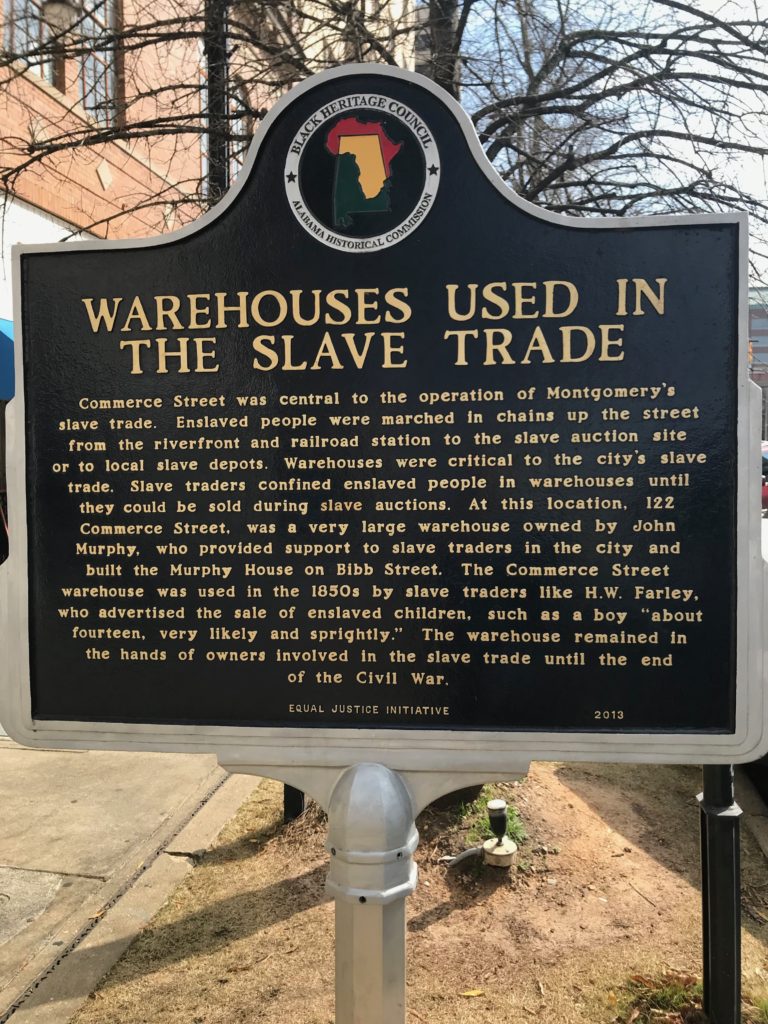
There’s an exhibit at The Legacy Museum set-up to look like you’re picking up a phone to talk to an inmate in prison. There’s a recording of a prisoner and you’re supposed to pick up the phone so you can listen to them tell you about life in prison. As fate would have it, I picked up the phone and listened to Kuntrell Jackson. When I put down the phone, I noticed a woman standing behind me. She was ash grey. She looked like she’d seen a ghost.
“I think the young man you were just watching in the video was standing here against the wall,” she said.
“The museum is stressful,” I said. “I’m not saying you’re hallucinating but I don’t see anyone who looks like Kuntrell Jackson.” She looked baffled. She looked embarrassed.
“I’m sorry,” she said. “I’m overwhelmed.”
“I understand,” I said.
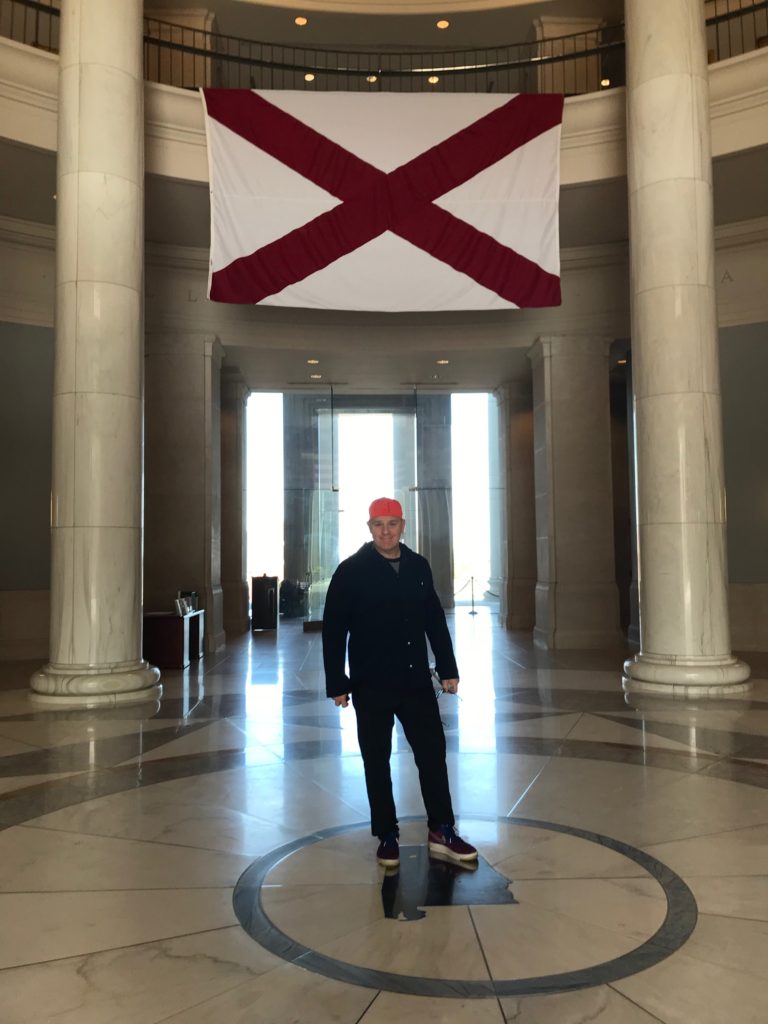
I didn’t really mean what I said. I was trying to be helpful. But the truth is, I wasn’t feeling swept away. The signs were awful. There were signs that said things like: “No Dogs, No Blacks, No Jews.” But I laughed at the signs. Maybe I was coping. Maybe I was using denial to push away emotion. I can’t say for sure. It’s hard to walk into a place and turn off the cynicism we carry around to protect ourselves from being seen as weak. I walked around the museum looking for a ghost.
I turned the corner and made eye contact with Kuntrell Jackson. He saw me. I saw him. I looked around for the woman. I couldn’t find her. I walked over to Kuntrell. He smiled at me. I asked if he was the young man in the video.
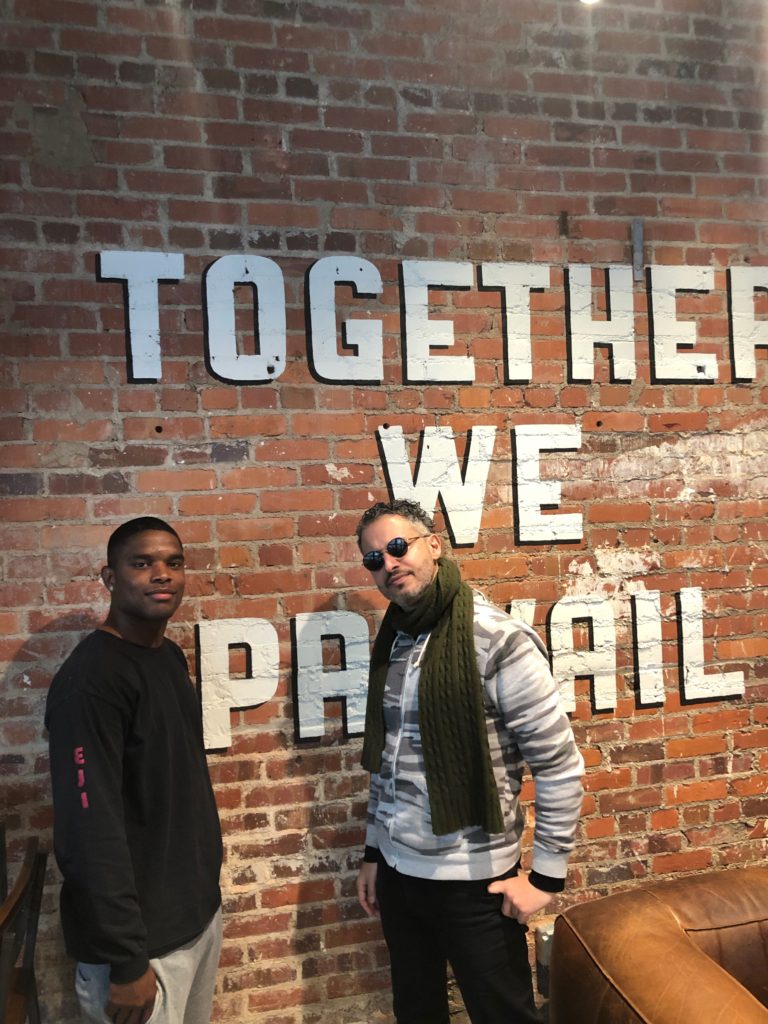
“That’s me,” he said. “I’m Kuntrell Jackson.”
“What are you doing here?” I asked. “Does The Legacy Museum hire you to wander around?”
“No,” he said. “I come here every day to watch the people watch my video. It heals me.”
I looked around to gather my composure. I noticed Vinny Vegas was standing next to me. He was floored. I’d never seen him look so off his game. Neither one of us knew what to do with the moment.
The momentum was pulling me away. I needed to regain control so I told Kuntrell there was a woman who’d seen him. I explained that I wrongly told her she’d seen a ghost and I wanted to track her down so I could make things right. I don’t know why I felt this way. Maybe it’s all the years of working in restaurants, suddenly I was schmoozing the room instead of letting myself cry.
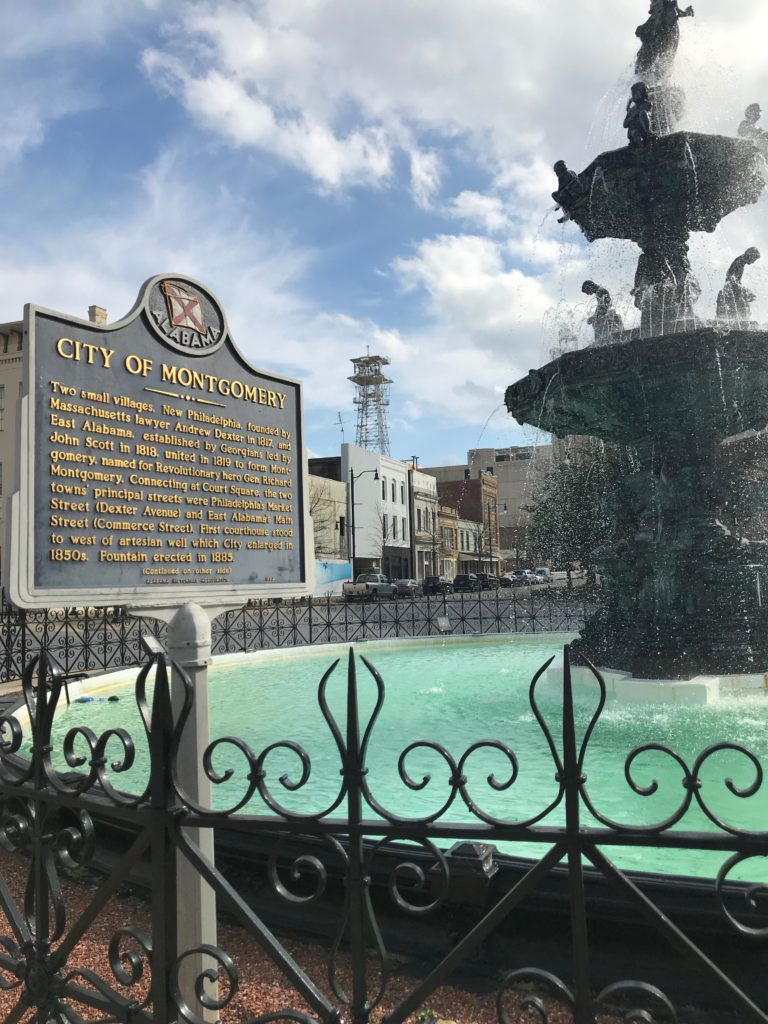
I never did find the woman. I circled the entire museum but she was nowhere to be found.
Next thing I knew, I was standing next to Vinny Vegas, laughing about No Dogs, No Blacks, No Jews. There was a kid standing next to me. I felt bad about laughing. So I turned to him to explain I wasn’t trying to be disrespectful, I was uncomfortable and I was sorry.
“There’s no need to be sorry,” he said. “I don’t know how I’m supposed to feel.”
“Are you here on vacation?” I asked. “Or are you here with school?”
“School,” he said. “I’m here with a writing workshop. We’re supposed to come here and then write about it.”
I turned to Vinny Vegas who was already looking at me like he knew exactly what I was about to say and he was totally on board with it.
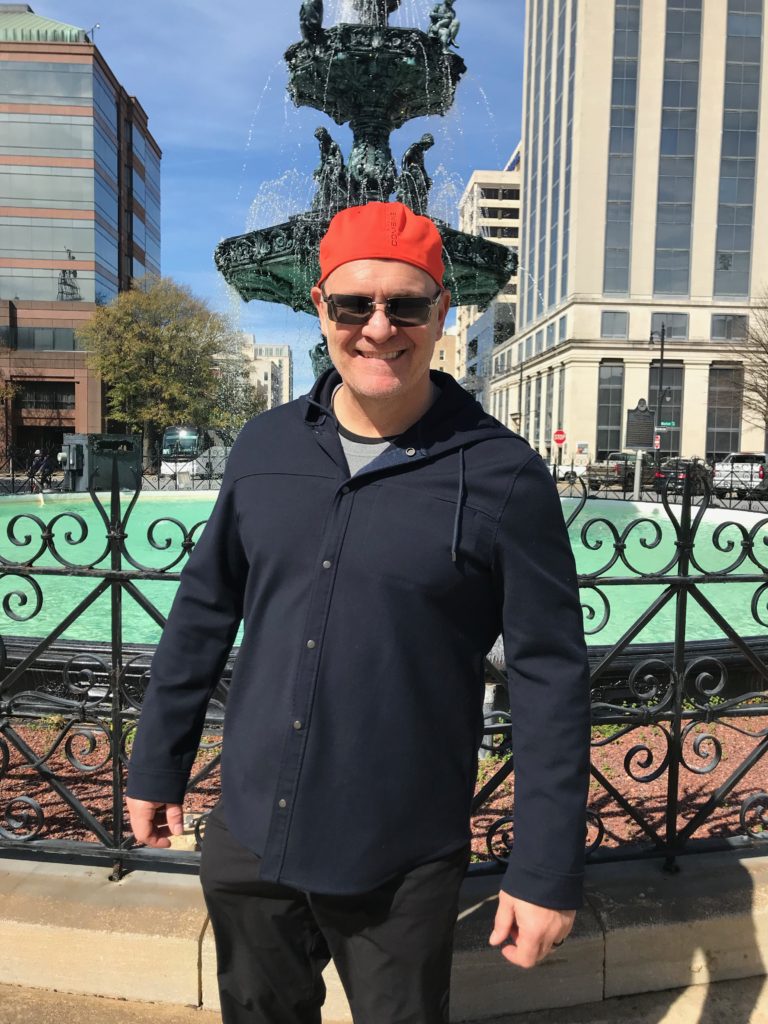
“Well then there’s someone I should introduce you to,” I said. “Follow me.”
I walked him over to the exhibit with the prison phones. I wanted to introduce him to Kuntrell Jackson. But he was nowhere to be found. Poof! Like a ghost who was never there to begin with, suddenly I knew how the woman felt when she was asking if it was possible for the young man in the video to be standing next to her. But then momentum burst, creating the space for me to shed the mask of a schmooze and slow down.
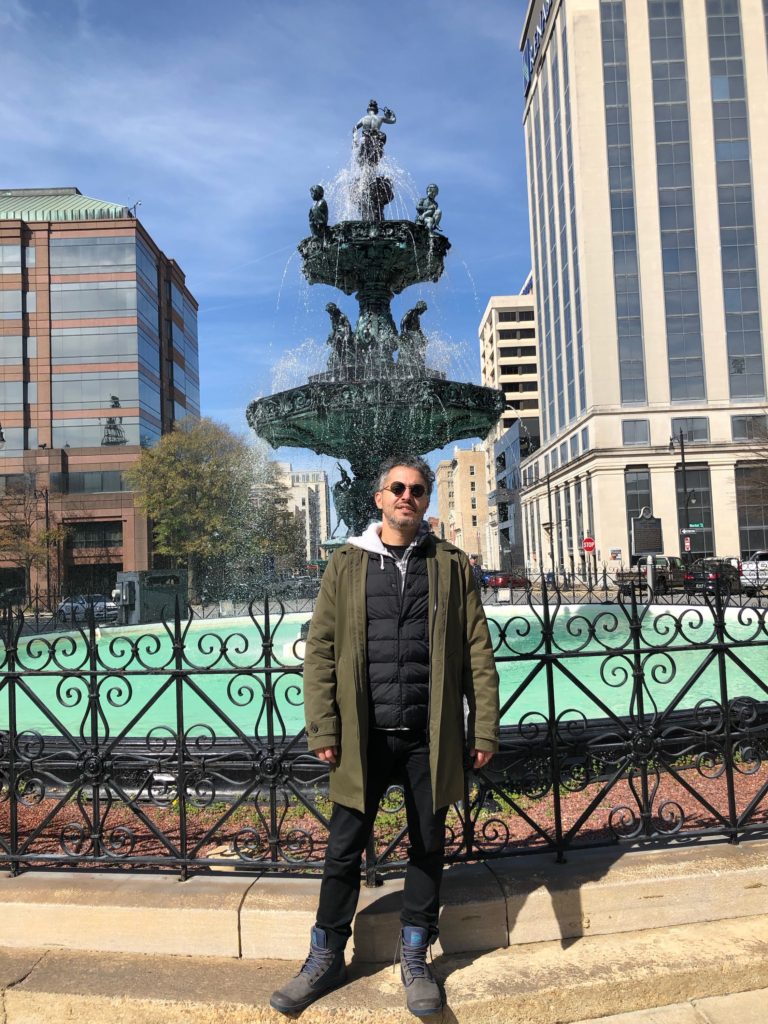
Sloooooow down.
Slooooooooooow down.
Kuntrell Jackson walked over to me. He smiled. I introduced him to the kid on a writing assignment. Before I walked away to leave them alone so they could share a moment, I asked Kuntrell if I could interview him. He said yes. We swapped emails and phone numbers and then poof…
He was gone.
In the basement of the Dexter Avenue Church is a mural. It highlights certain moments in the life of Dr. Martin Luther King. There’s an image of him in a jail cell. There’s an image of him being shot. There’s an image of him ascending. There are signs that say no pictures of the mural unless you’re in the picture. I loved the sentiment of this sign, as if to say this: place yourself in the world of MLK so you can touch greatness and then carry the feeling with you back into the world.
“Do you want me to take your picture?” Brenda asked.
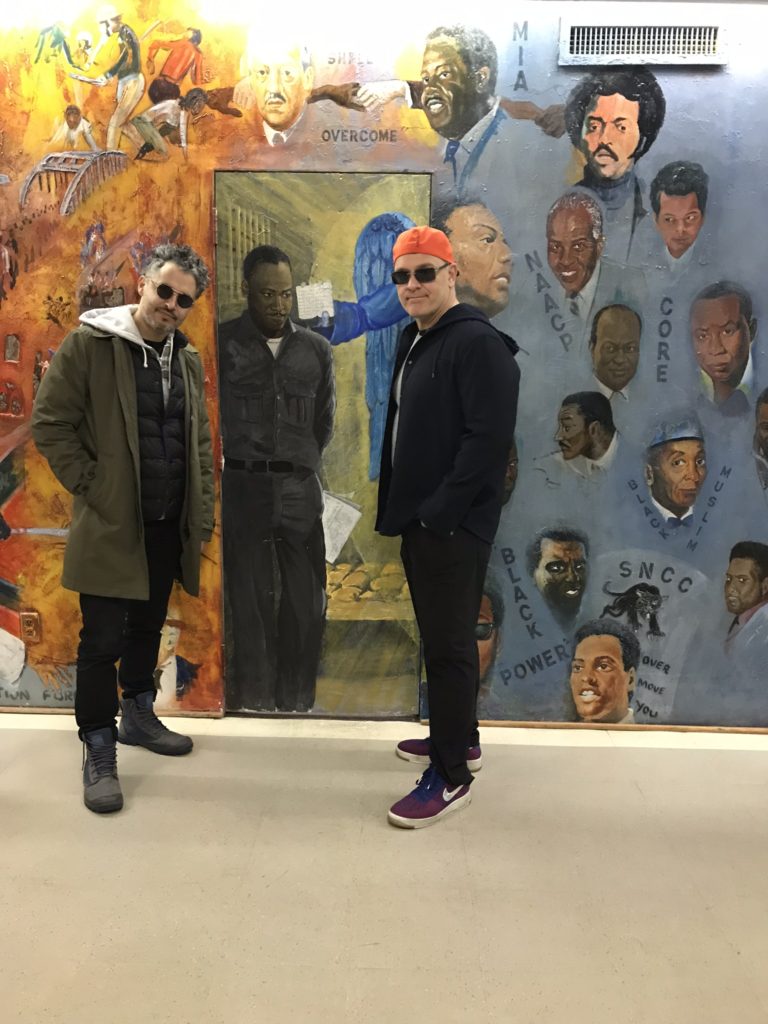
“Yes please,” I said. “Vinny Vegas! Get over here!”
He’d been in Dr. King’s office, studying the robe that was hanging next to the desk, contemplating the rotary phone and brick sitting on the windowsill. The Dexter Avenue Church is made from handmade bricks. Dexter Avenue used to be paved with bricks. The congregation was poor, so they took the broken bricks leftover from construction, lugged them across town and built a House Of Worship.
“I touched Dr. King’s robe,” Vinny Vegas said. “I was thinking about Dr. King wearing the robe. Then I was told it’s not Dr. King’s robe. It’s the robe of the current minister. Why couldn’t she let me believe it was Dr. King’s robe? I was having a moment. She stole my moment!”
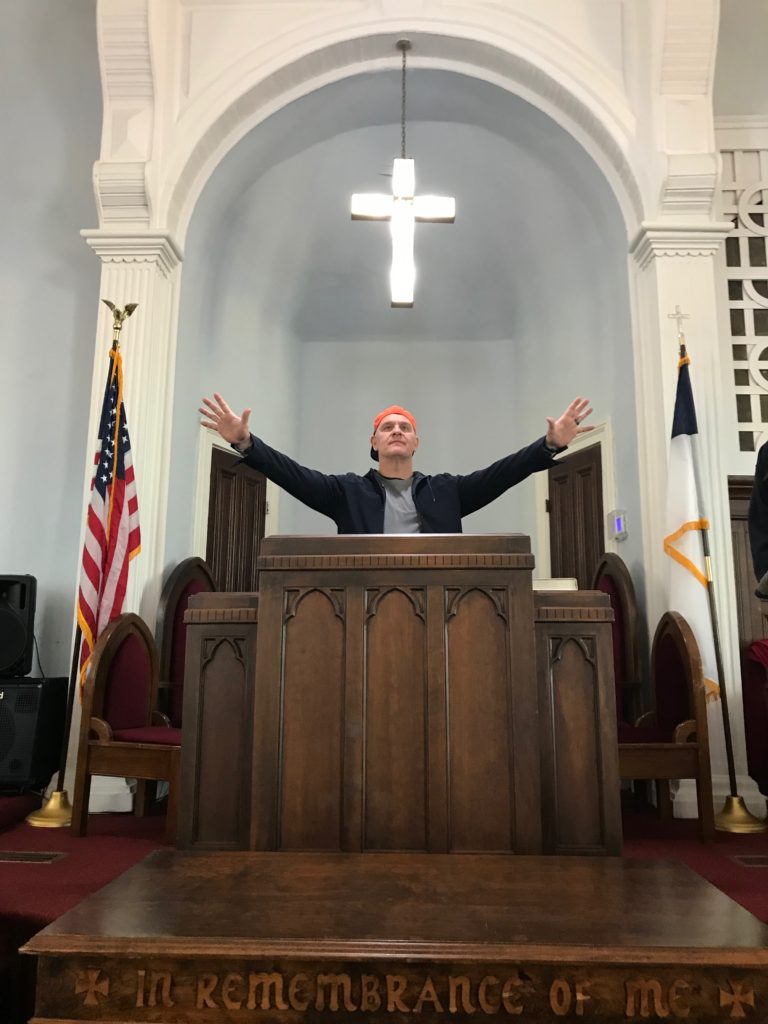
We went upstairs to take in the room. I stood on stage, taking in the smallness of the room. Vinny Vegas stood on stage, throwing up his arms like he was summoning the Holy Spirit. You have to cut the seriousness with goofing off. Otherwise you’re being disrespectful. You’d think the opposite was true, but too much respect is nothing more than pandering. You have to give yourself permission to take the edge off. This is the great gift of being friends with Vinny Vegas, nothing is sacred.
As we walked out of the church, Vinny Vegas noticed the reflection of the Dexter Avenue Church in the glass of the bank across the street.
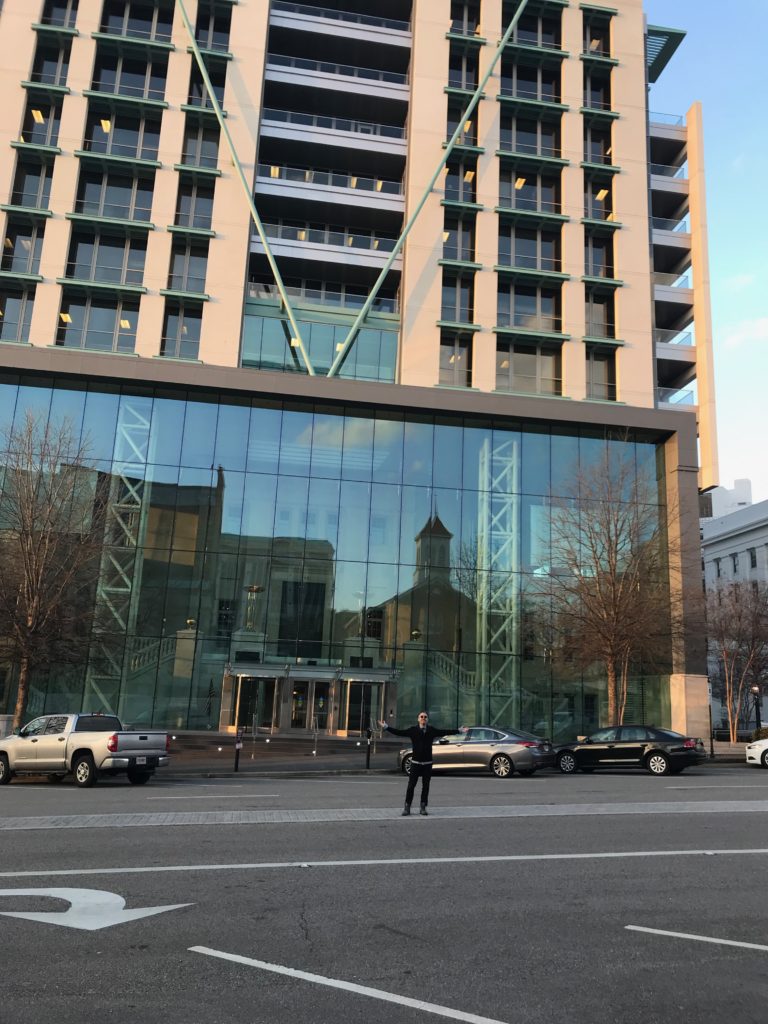
“Look at that bank,” he said. “Look at that gigantic bank. How can they afford something so big? I’ll tell you how! By robbing people with bounced check fees, loans they can’t afford, bankrupting them with mortgages. We still haven’t put a single banker behind bars for the financial meltdown of 2007. This town is broke but everywhere you look there’s a gigantic bank. What does that tell you?”
I took in the reflection, thinking how in 100 years the bank would be demolished, like all lies, but the Dexter Avenue Church would still be standing. All you need is goodness in your heart and a strong back to schlep handmade bricks across town.
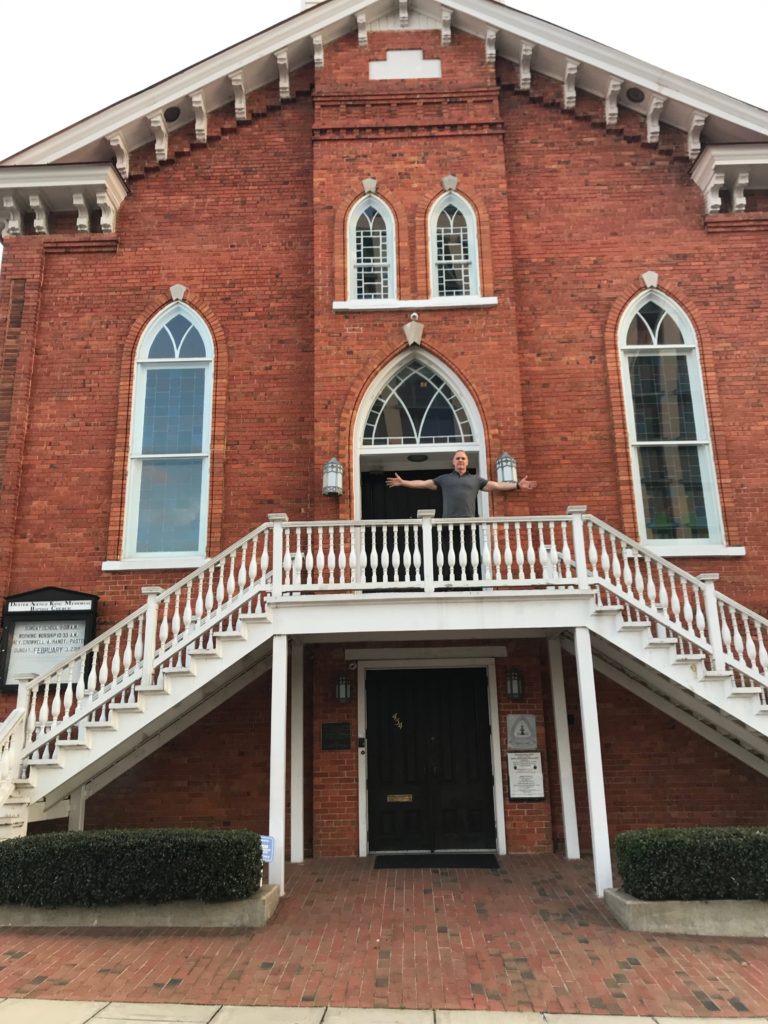
I have one last thing to say. When we were inside the church, there were two groups taking a tour. They introduced themselves. Brenda asked if anyone else wanted to make an introduction.
“I’m Gregor,” I said. “I’m here with my roommate from college, Vinny Vegas. We lived together under a loft in a tiny room in a fraternity house in 1988. He’s from Florida. I’m from Chicago, where last week it was the Polar Vortex. In more ways than I can express, I needed to escape the cold. Thank you for sharing your church with us, Brenda.”
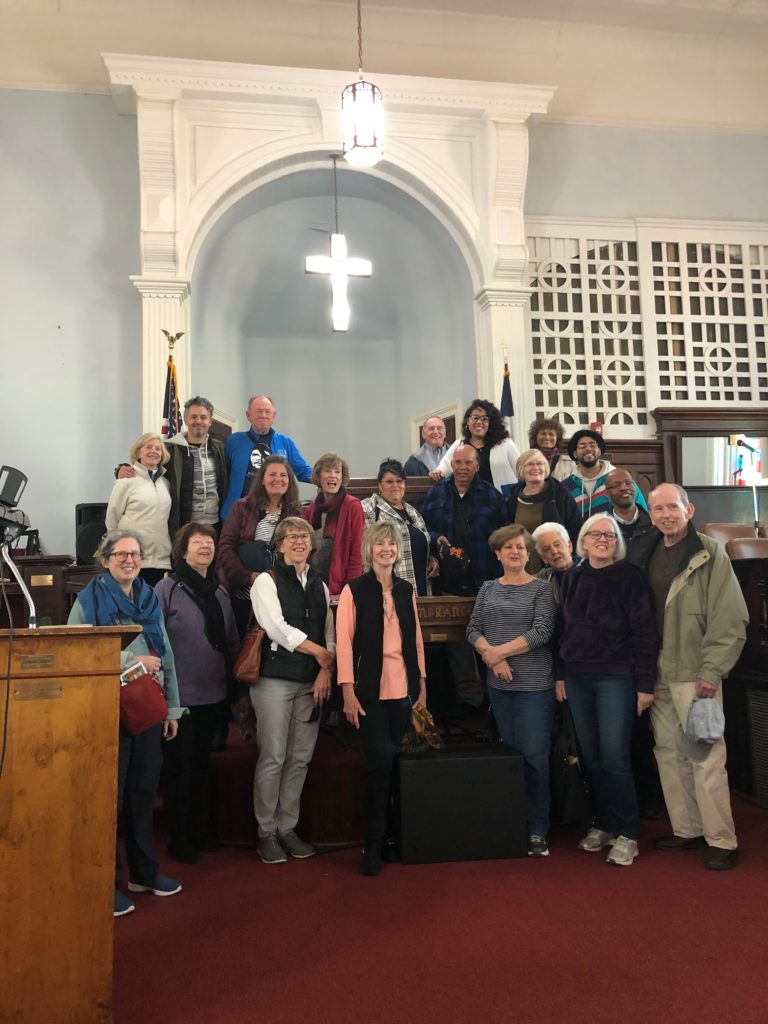
The room spontaneously burst into applause. Brenda thanked us for coming, then asked everyone to join hands. She asked us to close our eyes. She asked us to take in the moment. Then she asked if anyone wanted to lead the circle in prayer. No one said anything. I wanted to say something but I’d already talked and I didn’t want to over-talk the room. If you’ll allow me to step outside of momentum, I’d like to slow down.
Sloooooow down.
Slooooooooooow down.
Share with you the prayer I was feeling in the moment.
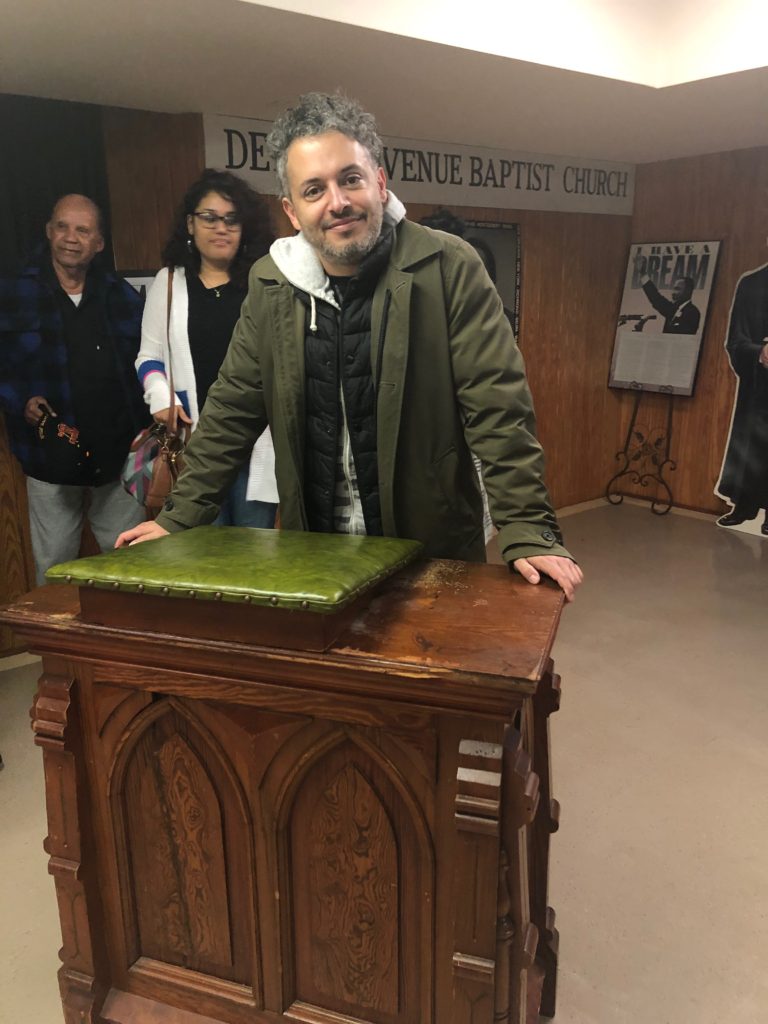
Dr. King, thank you for giving your life. I know your wife, Coretta, would have liked to lay down next to you each night as you grew old together. I know your daughters would have liked to watch your hair turn silver and recede. I know they would have liked to pick up the phone to call you, to hear your voice. Or text. You don’t even know what I mean by text, do you? I didn’t know how small your church was until I was blessed to stand in your shoes and for a brief moment, see the world through your eyes. Thank you for taking us to the mountaintop, for seeing Barack Obama before he was born. We had 8 beautiful years and now we’re paying for it. I feel so lost. Not in this moment but outside of this moment. I have let people down and I’m sorry. People have let me down and yet I cannot find the mercy to forgive them. I know the robe hanging in your office isn’t your robe after all but I hope wherever you are there’s a small office with a desk and a rotary phone and a robe hanging on the wall and it’s just about time for you to put on the robe to heal a small room filled with lost people, like me, seeking comfort in the sound of your beautiful voice. Thank you, Dr. King. Now if you’ll excuse me I have to go back home. There’s work to be done. We’re trying to elect Amara Enyia mayor of Chicago. You’d like her. She carries herself with grace. I look forward to the day when I can call her “Madame Mayor.”
I didn’t say this. I wish I had. But then again, there was something nice about everyone holding hands, saying nothing, connected to a moment, connected to each other, connected to a ghost in a small church on Dexter Avenue.
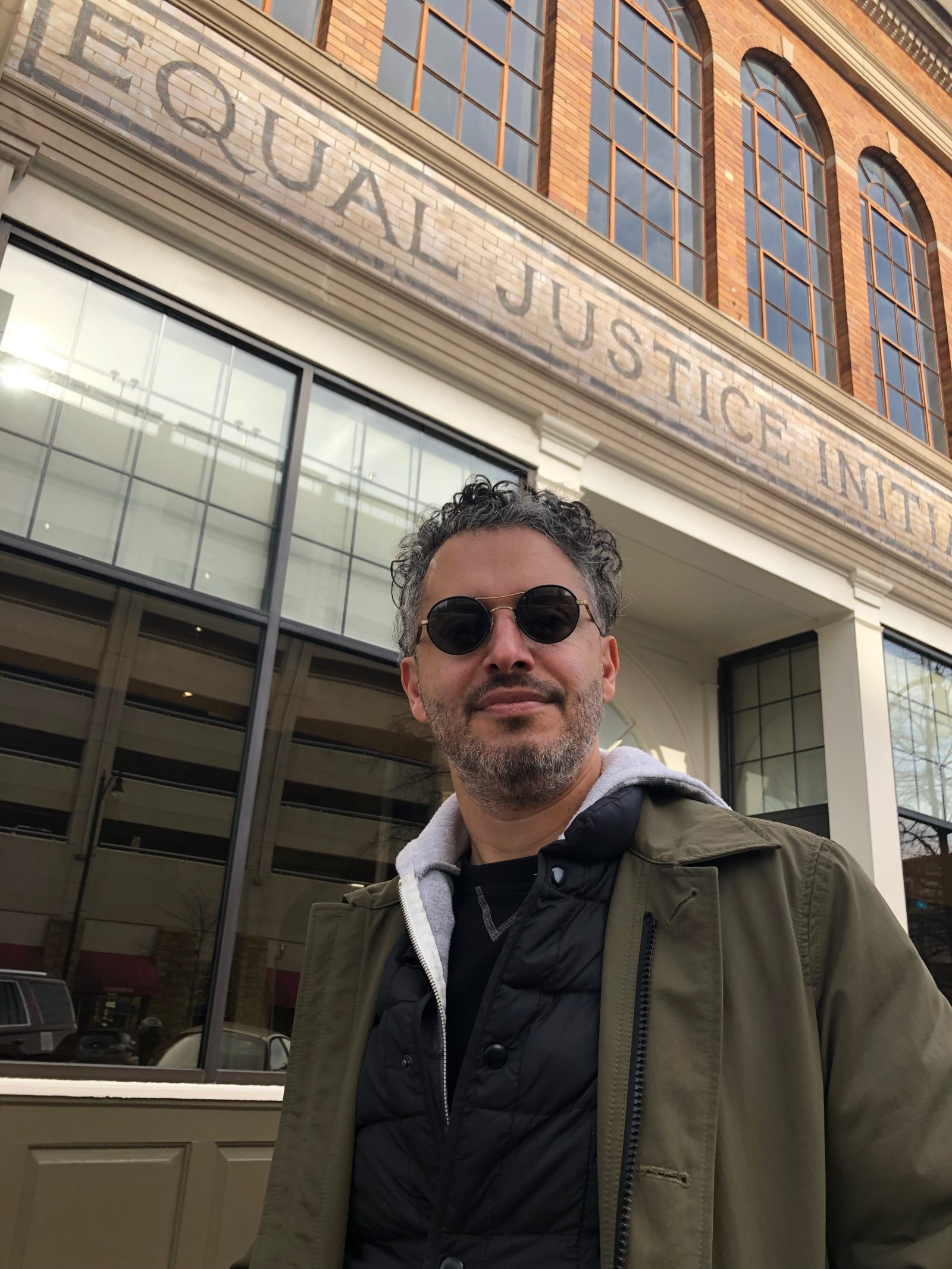
https://www.yahoo.com/news/increasingly-progressive-democratic-party-become-081500279.html
The thing I learned from the trip was that Mercy is best given to those who don’t deserve it.
We now have points of time to reflect on:
Slavery
Inmate leasing – once slavery was supposed to be over, they simply arrested blacks and then leased them as free workers to the plantations.
Jim Crow
Mass Incsrceration.
We are still in the mass incarceration phase.
We need more action than mercy right now.